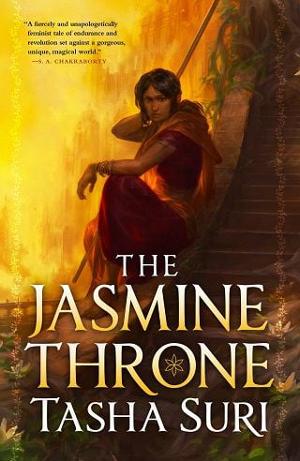Chapter 69: Malini
MALINI
The true name of an Aloran prince was no small thing. She did not think any highborn present failed to understand the importance of what was happening before them. Even the soldiers had fallen deathly silent.
“What,” she said, “has your name to do with me?”
He released a breath, as if she had struck him.
“Everything, Princess Malini,” he said. “Everything.”
He stared at the ground. Closed his eyes in pain and reverence, and when he spoke, it was in Aloran. Ancient, archaic Aloran, a melodic language that even Malini had never learned. But Aditya knew it, and she judged the weight of the prophecy by the way her brother’s face paled, and his eyes closed, and his head tipped back to the bleeding dusk.
“When she is crowned in jasmine, in needle-flower, in smoke and in fire, he will kneel before her and name her,” repeated Rao, in common Zaban. And suddenly Malini was shivering, every inch of her afire with a mad elation that rose up, up in her blood. “He will give the princess of Parijat her fate: He will say…” He swallowed. Raised his eyes, which were fierce and wet. “Name who shall sit upon the throne, princess. Name the flower of empire. Name the head that shall reign beneath a crown of poison. Name the hand that lit the pyre.” The silence was deep; a drumming tense silence, drawn taught as a bowstring. “He will name her thus,” finished Rao. “And she will know.”
Malini could not feel her feet beneath her. It was as if she were floating in her own skin, on a wave of something that wasn’t quite fear or quite joy but burned in her, headier than liquor, more potent than needle-flower.
“I lit the pyre,” Malini said jerkily. “I lit the monastery. It was me.”
She saw in his face then, that he had realized the same thing.
“Yes,” he said.
The moment was on a knife edge. How easily it could turn.
Malini looked once more at Aditya.
Aditya, who had rejected the throne over and over again. She had given him the tools to become emperor and he had discarded or lowered them, over and over again. She had told him the way power worked, and the price it demanded. He had not given power its due. When power had come, he had turned away from it.
But she had taken the arrow. She had set the monastery aflame.
And here—here was her chance to take power for herself. A terrible chance. If she took the crown Rao had placed in her hands, if she turned the noose of his words into a weapon…
It would be foolish to try to take what was not hers to take. Royal sons were the ones who wore the crown. Royal women were…
Well.
She thought of her fellow princess Alori, and of highborn Narina, and how they had screamed when the flames had touched them. How they had smelled as they burned, as their crowns of stars splintered around their skulls, as even the sweetness of perfume and flowers could not blot out the acrid scent of burnt hair and silk, or the smell of flesh, fat, marrow burning and burning and burning.
Royal women are only crowned in death, Malini thought furiously.
She did not want to die. She wanted her crown now. She had politicked for it; played for it and lost for it and nearly died for it. And yet here she was. Alive.
And here was Rao, an unnamed prince of Alor, his birth name a prophecy whispered in his mother’s ear. Here was the prince who had given her a crown and a throne and told her she had the right to grant them where she would.
Here he was. Kneeling before her.
It could not be done. She knew it could not be done. Her whole life, she had been told it could not.
But she had seen the look of hope and loyalty in the eyes of the men when she’d ordered them to battle. She had seen the way their faces changed when she had told them she was a mother of flame made flesh—a lie like a lever, a chain for their throat, a hand curled around the sinew and thick blood of their beating hearts.
She had Alor. She had a pact with the usurpers of Ahiranya.
She had herself.
Fate was closing around her. False, false fate. And yet she gloried in it, because this—this was an opportunity to be seized. And Malini was not fool enough to let it slip by.
The men were watching her. Her Aloran prince. Lords of Saketa and Dwarali, Srugna and Parijat.
Her brother, grief in his eyes.
She waited for him to speak. She gave him one heartbeat, and another, and watched him lower his eyes without a word.
“It would be a great sacrifice on my part, to rule this land,” Malini said, slow and solemn, as if her heart were not a burning coal, a thing of joy and rage. “I am only a woman, with brothers still living. If I am to rule… my lords, I must rule in the name of the mothers. I must rule as a mother of Parijatdvipa.
“I have not burned, as the mothers burned,” she continued. “I know it isn’t their will. But I burned my goodness upon the monastery’s flames. I burned my gentleness. I made a fitting empress of myself. My lords, if it is the will of the mothers and the nameless both, then I will take the throne of Parijatdvipa for the good of all of us. I will do it, as the prophecy demands.”
Silence. And then, a roar. An exultation.
Rao, shoulders trembling, did not rise.
“My empress,” he said. And his voice was not exultant, but empty.
She touched her knuckles to her chest.
The flower bloomed still, as if no water could kill it, no fire could burn it. Her needle-flower.
Priya’s face against Malini’s palm. The steady, piercing light of her eyes.
I know you. I know exactly who you are.
She let her hand lower.
She knew herself. She knew what she was beneath the artifice. But these men did not know her. They looked at her and saw the mother of flame she claimed to be. Some looked at her with calculation, considering her worth and her biddability, the potential benefit of rule beneath a woman of Parijat instead of an imperial son.
Some looked at her with real faith burning in their eyes.
Others—like the archers she had stood beside when she had loosed her own arrow and burned the monastery down—looked at her with something akin to respect.
All that, she could use.
She saw Aditya watching her. There was a bleak, accepting look on his face. No joy. He looked at her as if he saw her death upon her.
Well, let him. Let him. She would not grieve.
She could make something new of Parijatdvipa.
She could make herself something monstrous. She could be a creature born of poison and pyre, flame and blood. She had told Aditya that when the opportunity to seize power came—to wield it—the opportunity had to be taken and held and used. If he would not wield it, she would.
If he would not take their brother’s throne, in that room of sweet falling jasmine where the sisters of her heart had burned, then she would do it.
She was going to build a new world.
All this she would do, when she sat on Parijatdvipa’s throne.
But first, she thought quietly, savagely, to herself, as the men around her kneeled and shouted her name. Malini. Malini. Mother Malini. Empress Malini. I am going to find my emperor brother. I am going to make Chandra kneel before his peers, humiliated and broken. And I am going to watch him burn.
 Fullepub
Fullepub 



